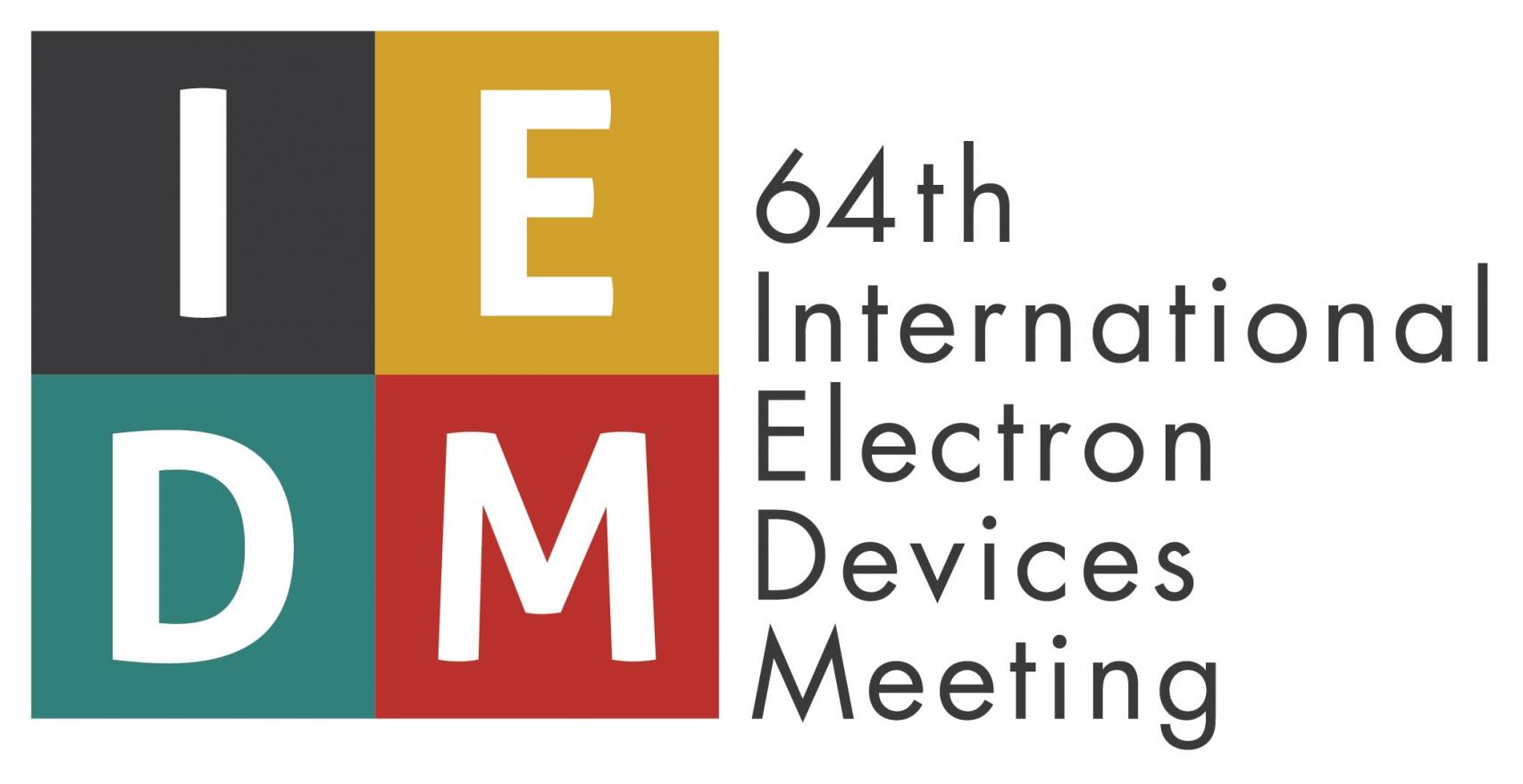 The International Electron Devices Meeting (IEDM) is one of the premier technical conferences covering semiconductor technology and is a must attend event. This years conference will be held December 1[SUP]st[/SUP] through 5th, 2018 at the Hilton San Francisco Union
The International Electron Devices Meeting (IEDM) is one of the premier technical conferences covering semiconductor technology and is a must attend event. This years conference will be held December 1[SUP]st[/SUP] through 5th, 2018 at the Hilton San Francisco Union
Square hotel.
Saturday September 1[SUP]st[/SUP] will feature 90 minute tutorials covering:
- Reliability Challenges in Advanced Technologies, Ryan Lu, TSMC
- STT-MRAM Design and Device Requirements, Shinichiro Shiratake, Toshiba Memory
- Quantum Computing Primer, Mark B. Ritter, IBM
- Power Transistors in Integrated BCD Technologies, Hal Edwards, Texas Instruments
- Design-Technology Co-optimization at RF and mmWave, Bertand Parvais, IMEC
- Emerging Device Technologies for Neuromorphic Computing, Damien Querlioz, CNRS
Sunday, September 2[SUP]nd[/SUP] will feature two full day “short courses”. I don’t typically arrive in time for the tutorials on Saturday but I always attend one of the short courses on Sunday and find them very useful:
It’s All About Memory, Not Logic!, organized by Nirmal Ramaswamy, Micron
- DRAM: Its Challenging History and Future, Dong Soo Woo, Samsung
- 3D Flash Memories: Overview of Cell Structures, Operations and Scaling Challenges, Makoto Fujiwara, Toshiba Memory Corporation.
- Emerging Memories Including Cross-Point, Opportunities and Challenges, Kiran Pangal, Intel
- Memory Reliability, Qualification and their Relation to System-Level Reliability Strategies, Todd Marquart, Micron
- Packaging Technology for High Bandwidth Memory, Nick (Namseog) Kim, SK Hynix
- Processing in Memory (PIM): Performance and Thermal Challenges and Opportunities, Mircea Stan, UVA
Scaling Survival Guide in the More-than-Moore Era, organized by Jin Cai, TSMC
- Extreme-UV Lithography – Principles, Present Status and Outlook, Tony Yen, ASML
- MOSFET Scaling Knobs (GAA, NCFET…) and Future Alternatives, Witek Maszara, Globalfoundries
- Overcoming Variation Challenges, Sivakumar Mudanai, Intel
- Embedded Memory: Present Status and Emerging Architecture and Technology for Future Applications, Eric Wang, TSMC
- 3D Integration for Density and Functionality, Julien Ryckaert, Imec
- Advanced Packaging: the Next Frontier for Moore’s “Law,” Subramanian Iyer, UCLA
The main conference begins Monday morning with three plenary addresses
- Future Computing Hardware for AI, Jeffery Welser, Vice President, IBM Research-Almaden
- “4th Industrial Revolution and Foundry: Challenges and Opportunities,” Eun Seung Jung, President of Foundry Business, Samsung Electronics
- The Status, Challenges and Opportunities of 5G, Prof. Gerhard P. Fettweis, TU Dresden
The schedule of the sessions over the next three days have not been announced yet but some of the focus sessions will be:
Quantum Computing
- Application Requirements for Quantum Computing, John Preskill, Caltech
- Materials and Device Challenges for Near-Term Superconducting Quantum Processors, Jerry Chow, IBM
- Towards Scalable Silicon Quantum Computing, Maud Vinet, CEA-Leti
- Silicon Isotope Technology for Quantum Computing, Kohei Itoh, Keio University
- Qubit Device Integration Using Advanced Semiconductor Manufacturing Process Technology, Ravi Pillarrisetty, Intel
- Scalable Quantum Computing with Single Dopant Atoms in Silicon, Andrea Morello, Univ. New South Wales
- Majorana Qubits, Leo Kouwenhoeven, Microsoft
Future Technologies Towards Wireless Communications: 5G and Beyond
- Intel 22nm FinFET (22FFL) Process Technology for RF and mmWave Applications and Circuit Design Optimization for FinFET Technology, Hyung-Jin Lee, Intel
- RFIC/CMOS Technologies for 5G, mmWave and Beyond, Ali Niknejad, UC Berkeley
- GaN HEMTs for 5G Base Station Applications, Shigeru Nakajima, Sumitomo Electron Devices
- Highly Integrated mm-Wave Transceivers for Communication Systems, Vadim Issakov, Infineon
- BAW Filters for 5G Bands, Robert Aigner, Qorvo
- Reconfigurable Micro/Millimeter-wave Filters, Dimitrios Peroulis, Purdue
Challenges for Wide Bandgap Device Adoption in Power Electronics
- GaN and SiC Devices for Automotive Applications, Tetsu Kachi, Nagoya University
- SiC MOSFET for Mainstream Adoption, Peter Friedrichs, Infineon
- GaN Power Commercialization with Highest Quality-Highest Reliability 650V HEMTs- Requirements, Successes and Challenges, Primit Parikh, Transphorm
- The Current Status and Future Prospects of SiC High Voltage Technology, Andrei Mihaila, ABB
- Barriers to Wide Bandgap Semiconductor Device Adoption in Power Electronics, Isik Kizilyalli, ARPA-E
- High to Ultra-High Voltage SiC Power Device Technology, Yoshiyuki Yonezawa, AIST
- Effects of Basal Plane Dislocations on SiC Power Device Reliability, Robert E. Stahlbush, Naval Research Laboratory
Interconnects to Enable Continued Technology Scaling
- Interconnect Design and Technology Optimization for Conventional and Exotic Nanoscale Devices: A Physical Design Perspective, A. Naeemi, Georgia Tech
- Mechanisms of Electromigration Damage in Cu Interconnects, C. K. Hu, IBM
- Interconnect Metals Beyond Copper: Reliability Challenges and Opportunities, K. Croes, Imec
- Microstructure Evolution and Effect on Resistivity for Cu Nano-interconnects and Beyond, Paul Ho, UT Austin
- Integrating Graphene into Future Generations of BEOL Interconnects, H.-S. Philip Wong, Stanford
- Interconnect Trends for Single Digit Nodes, Mehul Naik, Applied Materials
Tuesday evening December 4[SUP]th[/SUP] will see an evening panel session: EUV: Too Little, Too Late, Too Expensive or the Ultimate Cure-All?, organized by Sanjay Natarajan, Senior VP of Applied Materials. Much progress has been made in EUV patterning technology, and yet manufacturing throughput, masks, pellicles and resists still persist as problems today. The complexity of reliably transferring features at the 7nm node and below using quadruple patterning and 193nm immersion is affecting yield, affecting the cost-per-gate reduction and slowing down Moore’s Law. The industry eagerly awaits EUV, but is it too little, too late and too expensive, or is it the ultimate panacea? A team of world-renowned experts from the leading logic and memory IDMs, foundries and fabless companies will vigorously debate the issue.
A Luncheon will be held Wednesday, December 5[SUP]th[/SUP]: The speakers are yet to be determined, but IEDM will have a new lunch event this year that features industry leaders engaging the audience on the state of the industry, and on careers in device and VLSI technology. There will also be a vendor exhibition and poster sessions.
You can register for the conference and follow the program as it develops here.
Share this post via:






CEO Interview with Aftkhar Aslam of yieldWerx